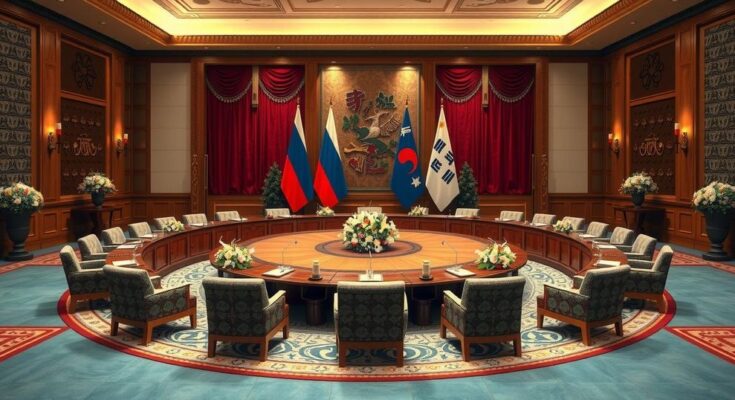A top Russian security official, Sergey Shoigu, met with Kim Jong Un in North Korea, amid rising military cooperation where North Korea has sent troops to assist Russia in Ukraine. The meeting follows recent missile tests by North Korea and highlights the delicate balance of geopolitical tensions in the region. Future diplomatic relations with the U.S. remain uncertain, particularly due to North Korea’s current support for Russia.
On Friday, a senior Russian security official, Sergey Shoigu, arrived in North Korea to meet with leader Kim Jong Un. The visit follows North Korea’s reported dispatch of additional troops to support Russia’s war efforts against Ukraine. Although details regarding the discussions between Shoigu and Kim were not disclosed, they have been characterized as significant given the evolving dynamics between the two nations.
North Korean state media confirmed Shoigu’s visit, leading a delegation, without specifying the objectives of the trip. This meeting aligns with increasing military exchanges, where North Korea has reportedly supplied weapons and troops to Russia. Observers highlight that North Korea’s assistance may be a strategy to gain economic benefits from Russia during the conflict.
There is speculation that Shoigu’s visit may relate to a potential trip by Kim to Russia, following the signing of a mutual defense treaty between Kim and President Vladimir Putin in 2024. Previous visits from Shoigu to North Korea included discussions on expanding military cooperation, emphasizing the tight ties formed between the two nations amidst international tensions.
Earlier on the day of Shoigu’s visit, North Korea conducted test launches of new anti-aircraft missiles, described as a crucial addition to its defense capabilities. This action coincided with the conclusion of joint military exercises by the United States and South Korea, which North Korea has historically condemned as provocations threatening its sovereignty.
North Korea’s Defense Ministry issued a warning to the United States and South Korea regarding the repercussions of these military drills, emphasizing the potential consequences of further provocations. The ongoing tensions complicate the landscape for diplomacy, with former President Trump expressing a willingness to renew discussions with Kim on nuclear issues, though North Korea’s current commitments may hinder such outreach in the near future.
The complexities of the geopolitical landscape, including North Korea’s involvement in Russia’s military campaign and the ongoing animosity with the U.S. and South Korea, underline the intricate relations in the region. Analysts suggest any revival of diplomatic efforts with North Korea may be more feasible once the military conflict in Ukraine stabilizes and concludes.
In summary, Sergey Shoigu’s visit to North Korea underscores the strengthened military collaboration between Russia and North Korea against the backdrop of the Ukraine conflict. As both nations navigate their strategic interests, North Korea continues to bolster its defense capabilities while maintaining a challenging stance against U.S. and South Korean military actions. The potential for future diplomatic endeavors remains uncertain, especially as North Korea prioritizes its alignment with Russia over engaging in denuclearization talks with the U.S.
Original Source: www.bostonglobe.com




